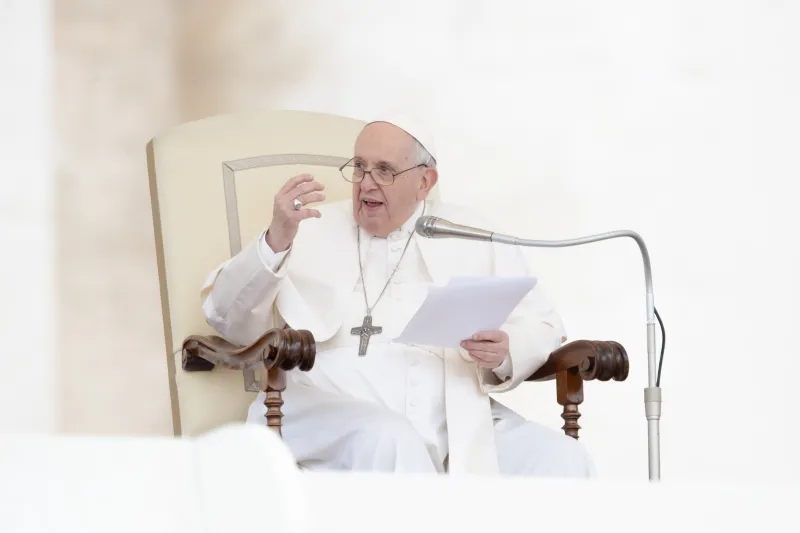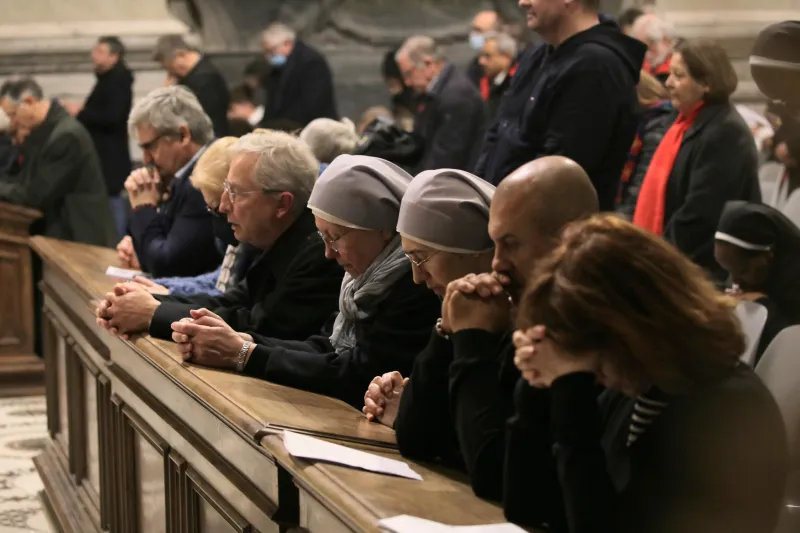 Pope Francis speaks at the general audience in St. Peter’s Square on May 4, 2022. / Daniel Ibanez/CNA
Pope Francis speaks at the general audience in St. Peter’s Square on May 4, 2022. / Daniel Ibanez/CNA
Vatican City, May 4, 2022 / 07:35 am (CNA).
Pope Francis said on Wednesday that having faith is not something only “for old people,” but an essential element of life.
“In many trends in our society and culture, the practice of faith suffers from a negative portrayal, sometimes in the form of cultural irony, sometimes with covert marginalization,” Pope Francis said at his general audience on May 4.
Speaking in St. Peter’s Square, the pope said that having faith is, instead, something to be proud of because “it has changed our lives, it has purified our minds, it has taught us the worship of God and the love of our neighbor.”
“The practice of faith is not the symbol of our weakness, but rather the sign of its strength,” he said.
The pope spoke at the general audience about the witness that the elderly can offer to younger generations by remaining faithful until the end, like the biblical figure of Eleazar, whose story is described in the Second Book of Maccabees.
Pope Francis encouraged the elderly to be like Eleazar in showing young people a consistent witness to the faith.
“We will show, in all humility and firmness, precisely in our old age, that believing is not something ‘for old people.’ No. It’s a matter of life,” he said at live-streamed audience.
The pope compared the tendency in modern society for people to claim to “have an interior spirituality,” and then do whatever they please, to “the first heresy of the Gnostics.”
The Gnostic heresy, named for the Greek word “gnosis,” meaning “knowledge,” exaggerated the importance of knowledge over faith and considered the body and matter to be evil. The result was a denial of the Incarnation of Christ and a focus more on thinking rather than living a good Christian life.
Pope Francis said: “The practice of faith for these Gnostics, who were already around at the time of Jesus, is regarded as a useless and even harmful external, as an antiquated residue, as a disguised superstition. In short, something for old men.”
“The pressure that this indiscriminate criticism exerts on the younger generations is strong,” he added.
The pope said that the “seductive trap” of Gnosticism is the proposal that “that faith is a spirituality, not a practice.”
“Faithfulness and the honor of faith, according to this heresy, have nothing to do with the behaviors of life, the institutions of the community, the symbols of the body. Nothing to do with it,” he said.
Pope Francis highlighted the commendable example of Eleazar, who “lived the coherence of his faith for a whole lifetime.”
He said: “The biblical story … tells of the episode of the Jews being forced by a king’s decree to eat meat sacrificed to idols. When it’s the turn of Eleazar, an elderly man highly respected by everyone, in his 90s … the king’s officials advised him to resort to a pretense, that is, to pretend to eat the meat without actually doing so. Hypocrisy … These people tell him, ‘Be a little bit of a hypocrite, no one will notice.’”
“It is a little thing, but Eleazar’s calm and firm response is based on an argument that strikes us. The central point is this: dishonoring the faith in old age, in order to gain a handful of days, cannot be compared with the legacy it must leave to the young, for entire generations to come,” the pope said.
Pope Francis remained seated throughout the general audience. He required assistance as he slowly hobbled up a ramp to reach his chair in St. Peter’s Square. The pope is reportedly receiving therapeutic injections for his knee injury this week.
In his greetings to pilgrims from different parts of the world, the pope encouraged people to pray the rosary every day during the month of May. He encouraged Polish pilgrims, in particular, to “entrust the fate of your homeland and peace in Europe to the Holy Virgin.”
Addressing French-speaking pilgrims, he greeted members of La Voie romaine (the Roman Way), an association supporting a group of mothers of priests walking from Paris to Rome to ask the pope to lift restrictions on the Traditional Latin Mass.
The mothers left the French capital on March 6 and arrived in Rome on April 30. They were expected to meet the pope at the end of the general audience, presenting him with thousands of messages from Catholics who say they were adversely affected by the motu proprio Traditionis custodes.
[…]




